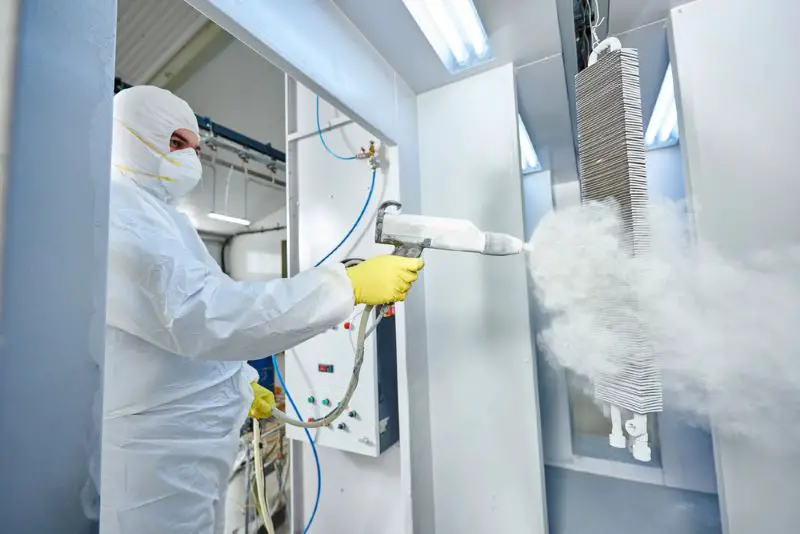Click here to get this post in PDF
In the demanding world of industrial operations, the longevity and efficiency of equipment are crucial for maintaining productivity and minimizing operational costs. One of the most effective yet often overlooked methods for extending the life of industrial equipment is through the use of functional industrial coatings. These specialized coatings provide a protective layer that shields equipment and their components from various forms of wear and tear, significantly improving their durability and performance.
Understanding Industrial Coatings
Functional Industrial coatings are protective layers applied to the surfaces of machinery and equipment to safeguard them against environmental factors, chemical exposure, and physical abrasion. These coatings are designed to withstand harsh conditions, such as extreme temperatures, corrosive substances, and repetitive use, making them essential in industries ranging from automotive, aerospace and defense to chemical processing and food processing.
The Benefits of Functional Industrial Coatings
- Corrosion Resistance
Corrosion is one of the leading causes of equipment deterioration, especially in industries that deal with moisture, chemicals, or salty environments. Functional Industrial coatings create a barrier that prevents corrosive elements from reaching the underlying metal surfaces. For instance, Halar® coatings, also known as ECTFE (ethylene chlorotrifluoroethylene) coatings, are widely used for their excellent corrosion resistance properties, effectively prolonging the lifespan of equipment exposed to harsh environments.
- Wear and Abrasion Protection
In high-wear environments, equipment surfaces can suffer from abrasion and mechanical damage. Functional Industrial coatings, such as Tefzel® ETFE (ethylene-tetrafluoroethylene) coatings, offer a hard and durable protective layer that resists scratches, gouges, and other forms of physical damage. This wear resistance is particularly valuable in sectors like chemical and material processing, where processing tanks are subjected to repetitive physical impact.
- Chemical Resistance
Many industrial applications involve exposure to harsh chemicals and solvents that can degrade equipment surfaces. Functional coatings can be applied to resist a wide range of chemicals, including acids, alkalis, and oils. This chemical resistance extends the useful lifespan of equipment and ensures that it remains functional and effective, even when exposed to aggressive substances.
- Friction Reduction
Teflon® PTFE (polytetrafluoroethylene) coatings are renowned for their exceptional low friction properties, which offer significant benefits across various applications. By providing a smooth, non-stick surface, PTFE coatings minimize friction between moving parts, reducing wear and tear and extending the lifespan of machinery. This reduction in friction also enhances energy efficiency, as less force is required to move components, leading to lower operational costs and improved performance. Additionally, PTFE’s resistance to corrosion and chemicals makes it ideal for harsh environments, further reinforcing its role in ensuring reliable and efficient operation.
Types of Functional Industrial Coatings
- Non Stick & Industrial Teflon® Coatings
Non-stick coatings, like Teflon®, prevent food from sticking to commercial cookware and bakeware, improving production output, reducing downtime and maintenance and significantly extending the life of the equipment. Industrial Teflon® coatings provide surfaces with durability, corrosion resistance, and low friction, enhancing performance and longevity in various industrial applications.
- Corrosion Resistant Coatings
Corrosion-resistant coatings are protective layers applied to surfaces to prevent or slow down the deterioration caused by environmental factors like moisture, chemicals, and salts. They are commonly used on metals and other materials to extend their lifespan and maintain their structural integrity by creating a barrier that shields the surface from corrosive elements.
- Dry Film Lubricants
Dry film lubricants are highly corrosion resistant coatings that reduce friction and wear between surfaces by forming an abrasion resistant barrier on metal and plastic surfaces. They are ideal for moving parts and repetitive-use environments, such as automotive and aerospace applications, where traditional lubricants might be impractical.
- Chemical Resistant Coatings
Chemical-resistant coatings are protective layers applied to surfaces to prevent damage from exposure to harsh chemicals, acids, and solvents. They create a barrier that shields the underlying material from corrosion, degradation, and wear caused by chemical interactions.
Application and Maintenance
The effectiveness of functional industrial coatings in extending equipment longevity hinges on meticulous application and consistent maintenance. Proper surface preparation is crucial, involving cleaning, sanding, and/or priming to ensure that the coating adheres well. Application methods such as spraying, brushing, or dipping are selected based on the part specifications and coating applied. Exact curing temperatures and times are essential for achieving a durable, protective layer. Post-application, thorough inspections help identify any defects or issues, ensuring the coating is effective before the equipment or component goes into to service.
Regular maintenance is equally important for preserving the protective qualities of functional industrial coatings. Routine inspections should be conducted to detect signs of wear or damage, and cleaning with appropriate methods prevents contaminants from compromising the coating. Minor damages can be addressed with touch-ups, and periodic reapplication may be necessary to maintain optimal protection. Keeping detailed records of coating applications and maintenance activities aids in tracking performance and planning future upkeep, ultimately contributing to the extended lifespan and reliable operation of industrial equipment.
Conclusion
Functional industrial coatings play a vital role in enhancing the longevity and performance of equipment across various industries. By providing protection against corrosion, abrasion, wear, and chemical exposure, these coatings help to minimize downtime, reduce maintenance costs, and extend the lifespan of valuable equipment and their components. As industries continue to evolve and face new challenges, the importance of functional industrial coatings in maintaining operational efficiency and equipment reliability will remain a critical consideration for businesses aiming to stay competitive in a demanding market.
About the Author
Mike Hughes is a Sales Engineer at Orion Industries, Ltd., the leader in functional industrial coatings and applications. He provides technical consulting and support to Orion’s manufacturing customers to improve the performance and functionality of their products and components. Mike draws from his BS degree in mechanical engineering to understand the geometric and product functionality nuances of each customer’s application to offer optimal coating solutions.
You may also like: The benefits to businesses of metal pre-treatment and powder coating
Image source: DepositPhotos.com


